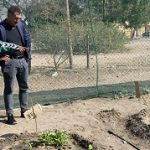The United States Ambassador to Namibia, Randy Berry, recently visited Tsumkwe to meet with community leaders, students, conservation actors, and health service providers.
During his two-day visit, Ambassador Berry stopped by the Mangetti Dune Health Centre, where he met with the nurse-in-charge and Tuberculosis field promoter to tour the facility.
The nurse highlighted HIV/TB services available at the site through the support of the U.S. President’s Emergency Plan for AIDS Relief, a CDC-backed initiative. She further emphasized the community’s concerns, such as distances to health care services and transportation issues.
Furthermore, the Ambassador visited the Tsumkwe Secondary School, where he interacted with grade 11 learners. The Ambassador provided an overview of the efforts of the U.S. Embassy in Namibia, including enhancing bilateral relations via increased free trade and investment to create an inclusive Namibian economy, enabling a rules-based democracy, and unlocking Namibia’s human potential through health and education. He also discussed the many options provided by the Embassy and urged learners to strive for excellence in their educational endeavours.
Ambassador Berry also paid a courtesy visit to the Chief of Ju’/hoansi Traditional Authority, Tsamkxao ‡Oma Bobo. During their conversations, Chief Bobo emphasized the dual challenges that his community faces, extreme poverty and lack of education.
Ambassador Berry expressed his openness to take on challenges highlighted by Chief Bobo by seeking to attract more U.S. investment which will accelerate broad-based economic development for his community and Namibia.
Ambassador Berry then visited the Tsumkwe Clinic Integrated Food Systems Project, which intends to create an integrated community-based food system around the clinic. The goal is to empower small-scale agriculture in the community, allowing for better nutrition and economic opportunity. He further saw economic and community development in villages outside the Tsumkwe settlement, where enterprising farmers grow and sell higher-value crops like papaya and drying devil’s claw harvested from the area.
These efforts, supported by the Nyae Nyae Development Foundation Namibia, seek to strengthen communities in and around Tsumkwe by improving their economic and social well-being.
Ambassador Berry concluded his day by meeting with the Nyae Nyae Conservancy and Community Forest. It is a community-based organization responsible for managing the natural resources in the Nyae Nyae area. During their discussions, the leadership highlighted how conservancy provides much-needed income for the constituency through conservation hunting, tourism, crafts, and agriculture – principally driven by harvesting the devil’s claw for commercial use. However, conservation actors agreed that though conservation is regarded as the economic driver for the Tsumkwe settlement, the area still faces severe economic and social challenges due in part to the remote location and arid climate.
“The trip provided valuable insights into the realities of life in a remote corner of Namibia, which is rich in natural and cultural heritage,” Ambassador Berry said when asked about his trip. The visit’s information will assist target U.S. programmes and efforts to respond to real needs on the grounds, the Embassy noted.
Randy Berry visited the World Food Program and supported Tsumkwe Clinic Integrated Food Systems Project.



Leave a Reply